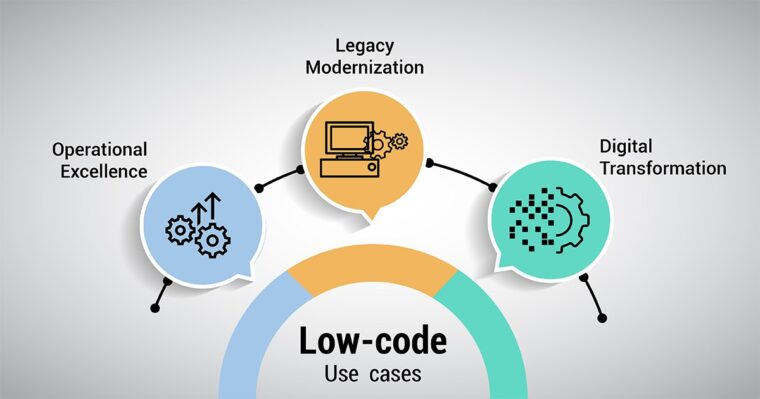The world of business is becoming increasingly digital. Companies of all sizes are seeking to leverage technology to improve their operations, streamline their processes, and stay competitive in an ever-evolving market. One such technology that’s making a big splash is low-code development platforms. These tools allow businesses to create custom software solutions without the need for extensive coding knowledge. For instance, consider Latenode, a platform that enables users to build, test, and deploy different integrations with minimal coding. But the power of low-code doesn’t stop at application development. It extends into another critical area of business – automation.
The Emergence of Low-Code Platforms

Low-code platforms have emerged as a transformative force in the business world. By simplifying the process of software development, they have democratized access to custom software solutions. Now, even businesses without a team of skilled programmers can create bespoke applications tailored to their specific needs.
Low-code platforms are designed with simplicity and ease of use in mind. They use visual interfaces, drag-and-drop functionality, and pre-built templates to facilitate the development process. This means that business professionals can create functional applications without needing to understand complex programming languages.
The Power of Integration
Yet, one of the most significant advantages of low-code platforms is their ability to integrate with other software systems. Many businesses use a multitude of software applications for various functions, such as customer relationship management (CRM), enterprise resource planning (ERP), human resources (HR), and more. Each of these systems generates vast amounts of data. The challenge is to make this data work together in a meaningful way to drive business efficiency and growth.
This is where low-code platforms shine. Their integration capabilities mean that they can connect disparate systems, allowing data to flow seamlessly between them. This not only streamlines processes but also ensures that all parts of the business have access to the same, up-to-date information. This can have a profound impact on decision-making, as decisions are based on accurate, real-time data.
Low-Code and Business Automation

Low-code platforms are a key tool in business automation. Automation involves using technology to perform repetitive tasks that would otherwise require human intervention. By automating these tasks, businesses can save time, reduce errors, and free up staff to focus on more strategic activities.
With their user-friendly interfaces and integration capabilities, low-code platforms make automation accessible to businesses of all sizes. They can automate processes such as data entry, report generation, and even customer service via chatbots. By integrating with other systems, they can also trigger automated actions based on specific conditions. For example, an HR system might automatically generate a task in a project management tool when a new employee is hired.
Revolutionizing Workflow with Low-Code Platforms
Low-code platforms offer the potential to revolutionize your workflow, making it more agile and responsive to changes in your business environment. This is possible due to the platforms’ inherent flexibility. With traditional software development, making changes to a program can be a time-consuming process, requiring hours of coding and testing. However, with a low-code platform, adjustments can be made quickly through a user-friendly interface, often with simple drag-and-drop actions.
This flexibility extends to the integration of new technologies. As the digital landscape evolves, businesses need to be able to quickly adopt and integrate new technologies into their operations. Low-code platforms facilitate this by allowing for easy integration with a wide range of applications and services. This means you can incorporate cutting-edge technology into your operations without the need for extensive redevelopment of your existing systems.
Enhancing Customer Experience with Low-Code

In today’s digital age, providing a high-quality customer experience is crucial. Customers expect seamless, personalized interactions across all touchpoints, and businesses that fail to deliver risk losing customers to competitors.
Low-code platforms can play a key role in enhancing the customer experience. By integrating with CRM systems, social media platforms, and other customer-facing applications, low-code solutions can help create a unified, omni-channel customer experience. They can also facilitate the development of customer-facing apps that provide value-added services, further enhancing the customer experience.
For example, a business could use a low-code platform to develop a mobile app that provides customers with real-time updates on their orders, access to customer support, and personalized product recommendations. Such an app could significantly enhance the customer experience, leading to increased customer loyalty and ultimately, higher sales.
Empowering Employees with Low-Code
In addition to enhancing the customer experience, low-code platforms can also empower employees. By automating mundane and repetitive tasks, low-code solutions free up employees to focus on higher-value work that requires human creativity and insight.
Furthermore, low-code platforms can democratize application development within an organization. Since they don’t require extensive coding knowledge, non-technical staff can use low-code platforms to develop applications that meet their specific needs. This can lead to greater efficiency, as employees no longer have to wait for IT departments to develop the tools they need.
The Future of Business is Low-Code

Looking to the future, it’s clear that low-code platforms will play an increasingly important role in business operations. As businesses continue to seek ways to improve efficiency, streamline operations, and deliver superior customer experiences, the demand for low-code solutions is likely to grow.
Moreover, as the pace of technological change continues to accelerate, the ability to quickly adapt to new technologies and integrate them into business operations will become increasingly important. Here, the flexibility and ease-of-use of low-code platforms will prove invaluable.
The Competitive Edge
In today’s fast-paced business world, staying ahead of the competition is crucial. Low-code platforms provide a competitive edge by enabling businesses to automate their processes, integrate their systems, and make data-driven decisions. By streamlining operations and improving efficiency, they allow businesses to deliver better products and services, enhance customer satisfaction, and ultimately, drive growth.
In conclusion, the importance of low-code platforms and their integration capabilities for business automation cannot be overstated. They are a powerful tool that can transform the way businesses operate, making them more efficient, effective, and competitive. Whether it’s building a custom application, integrating disparate systems, or automating repetitive tasks, low-code platforms like Latenode offer a world of possibilities for businesses ready to embrace the digital revolution.
